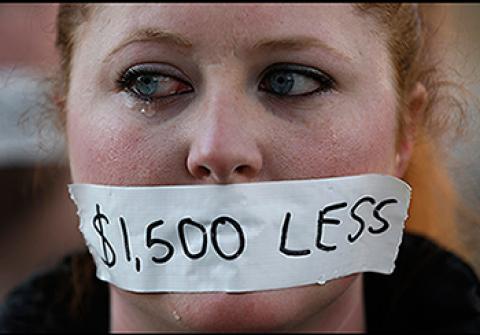At least 117 bills introduced in 2013 fuel a "race to the bottom" in wages, benefits, and worker rights and resemble "model" bills from the American Legislative Exchange Council (ALEC), according to a new analysis by the Center for Media and Democracy (CMD), publishers of ALECexposed.org.
"Right to Work" protesterA silent protester cries while wearing a sticker over her mouth signifying the loss in wages from the "Right to Work" law in Lansing, Mich., Wednesday, Dec. 12, 2012. Michigan became the 24th state with a right-to-work law after Gov. Rick Snyder signed the bill. (AP Photo/Paul Sancya)
As working Americans speak out for higher wages, better benefits, and respect in the workplace, a coordinated, nationwide campaign to silence them is mounting -- and ALEC is at the heart of it. ALEC corporations, right-wing think tanks, and monied interests like the Koch brothers are pushing legislation throughout the country designed to drive down wages; limit health care, pensions, and other benefits; and cripple working families' participation in the political and legislative process.
ALEC has pushed an anti-worker agenda since at least 1979, when it began striking out against "forced unionism" and for a "right to work," says a 1998 ALEC document. This "right to work" agenda does not create jobs or job security, but it does tilt the playing field against workers to give corporations more profits -- and CEOs more power -- in the workplace and in the political arena.
Emboldened ALEC Goes on the Offense
Shortly after the 2010 election in which Republicans won control of 26 state houses, ALEC welcomed hundreds of new members at its annual States and Nation Policy Summit in Washington, D.C. December 1-3. On the agenda: how to crush unions -- key funders of the Democratic Party. Wisconsin Senator Majority leader and ALEC state chair Scott Fitzgerald said of the meeting, "I was surprised about how much momentum there was in and around that discussion, like nothing I have ever seen before."
On February 11, 2011, ALEC legislators and Wisconsin Governor Scott Walker (a former state legislator and ALEC alum) sent shock waves through the state by introducing a "Budget Repair Bill" (Act 10) that effectively eliminated collective bargaining for 380,000 school teachers, snow plow drivers, prison guards, nurses, bus drivers, and more. A key aspect of the law, which prohibits government employers from using payroll deduction of union dues, reflects ALEC's so-called "paycheck protection" bills and the "Public Employer Payroll Deduction Policy Act."
Wisconsin Capitol protest 2011Wisconsin Capitol protest 2011The move generated massive protests, an 18-day occupation of the Capitol, and an attempted recall. Video of Walker talking to a billionaire campaign contributor surfaced in which he explained that the goal was to "divide and conquer" -- first going after public sector workers, then private sector. Another governor with deep ties to ALEC, Governor John Kasich of Ohio, and his ALEC legislators followed Wisconsin's lead when they attempted to strip some 350,000 workers of their collective bargaining rights, but the Ohioans succeeded in overturning the law by statewide referendum in November 2011.
ALEC's mallet of choice for private-sector workers is so-called "Right to Work" legislation. These laws were utilitized in Southern states before and after WWII to supresss wages and keep out unions like the CIO, which supported an end to Jim Crow laws and racial segregation. In the decades that followed, they made little headway in northern states. In 2012, however, Governor Mitch Daniels of Indiana rammed a "Right to Work" bill through the legislature. Next was the battle royale in Michigan. Governor Rick Snyder pushed "Right to Work" through a lame duck session in December 2012 right before a new, more worker-friendly legislature was sworn in. As CMD reported, it contained verbatim language from the ALEC bill.
In every instance, ALEC and the Kochs were there to cheer the radical policies on. Koch Industries has long been an ALEC funder, serving on ALEC's corporate "Private Enterprise" board, but the Kochs also exercise their power through Americans for Prosperity, a David Koch founded and funded political action group that spent millions on TV defending ALEC legislators and Scott Walker against recall and providing fake, astroturf support for the bills in Ohio and Michigan. It's not the first time the Koch family has come to the aid of union-busting bills. The Institute for Southern Studies points out that in 1958, Kansas passed a right-to-work law "with the support of Texas-born energy businessman Fred Koch, who viewed unions as vessels for communism and integration."
Other high-profile ALEC fights include battles over "paycheck protection" in Alabama, Arizona, Florida, and Missouri. In 2012, Californians battled an ALEC-style "paycheck protection" bill, disguised as campaign finance reform. Prop 32 was defeated at the polls in November 2012, but not until millions had been spent on both sides. Opponents were right to be worried. New numbers from the Milwaukee Journal Sentinel show that Wisconsin's Act 10, which crippled unions' ability to negotiate for better pay and benefits, cut union membership in half and forced workers to pay thousands more in benefits.
While ALEC and its supporters frame their actions as fiscally responsible and pro-worker, it is clear that this is a deeply political agenda. An analysis by the Economic Policy Institute (EPI) shows that, on the whole, these types of bills don't create new rights for employees but "significantly tilt the political playing field by enabling unlimited corporate political spending while restricting political spending of organized workers." Fox News reporter Shepard Smith put it even more bluntly. He noted that of the top 10 political donors in the United States, only three donated to Democrats -- all unions. "Bust the unions, and it's over" for the Democrats, he said.
Read more here


Spread the word